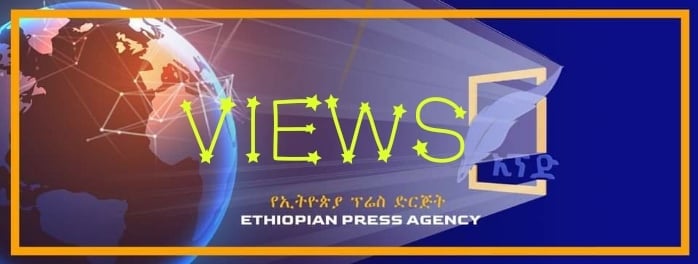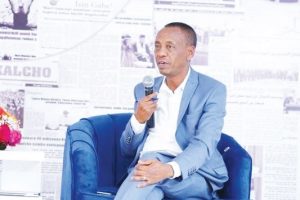
BY BLEN M. DIRIBA, DEJEN RAS AND SHEWA DAGNE
Abiy Ahmed was born in a small town of Bashasha, Jimma, in the southwestern part of Ethiopia and Meles Zenawi was born in Adwa, Tigray, in northern Ethiopia. Both were/are soldiers, politicians and became prime ministers of the country following a different path to power. Meles is hailed by the West for his contribution in the armed struggle to the overthrow of the Communist Derg Regime, while Abiy was cheered for the liberal oriented reforms he introduced in Ethiopia after nearly 3 decades of TPLF-led-EPRDF authoritarianism. He was also famously applauded by the international community for breaking the cycle of violence between Ethiopia and neighbouring Eritrea, nations that lived under ‘No War No Peace’ stalemate for more than 20 years; for which he was awarded the Nobel Prize in 2019. Meles launched the GERD project, Abiy is on the way to accomplish it. Both have their own initiative, their own goals, their own legacy & their own way of understanding national & global affairs. Both have set Ethiopia on different paths. And for that, both Ethiopians & the international community have apparently varying perceptions of the two prominent prime ministers. This short piece tries to reflect on this.
Ideological resemblance: Between a Marxist-Leninist & a progressive liberal technocrat
Meles Zenawi was a stunt believer in Marxist-Leninist ideology dating back to his youth. And he, along with his fellow comrades/TPLF Oligarchy like Sibehat Nega, designed a political party system based on that ideology. Using his remarkably deceptive demeanor, he managed to be friends with the capitalist, liberal, and democratic WEST to overthrow the authoritarian & Communist Derg Regime. He was a skilled manipulator and a crafty statesman that very much understand the weak spots and sensitivities of the western world, such as terrorism, state collapse in strategic geopolitical locations, and so on. He forged a strong alliance with the US government offering subservient alliance with the US security & military establishment in the fight against terrorism in Somalia.
He also efficiently exploited Ethiopia’s position & profound influence in the horn and whole of Africa, and the African Union to buy the allegiance & reliability of the west on his self-centered political wisdom & power position. Characterwise, Meles is an absolutist & a tyrant that has zero tolerance to any person or entity that appears a threat to his power & his party’s political interest. For Meles, Ethiopia is an old empire – an empire that has forcefully imposed a unitary identity on inherently autonomous ethnic groups. Hence, his political orientation is shaped under the frame of a state weakening ethnic federalism that amplifies differences than unifying sociopolitical assets.
On the other hand, Abiy Ahmed is a liberal reformist. A young charismatic leader with pragmatic democratic & economic ambitions. Unlike Meles, Abiy’s political ideology augments the common sociopolitical and cultural assets of Ethiopians from every corner of the nation and targets a synergised national coexistence for peace and prosperity. Perhaps the reason why he dismantled Meles Zenawi’s EPRDF & invented the Prosperity party that more or less fully reflects his political ideology. Unlike Meles, Abiy Ahmed endorsed capitalism, privatisation, environmentalism, democracy & other values that are famously known as western. Nonetheless, the western world was more friendly to the tyrant Meles Zenawi than it is today to the relatively liberal Abiy Ahmed.
The important question here is ‘why?’. The difference in the western approach towards both leaders emanates from the difference in the level of commitment both have for Ethiopia as a nation, and for the west as an ally. While Abiy is an Ethionationalist who firmly believes in the unified and dignified existence of Ethiopia, Meles considers himself and his party as a guarantor of rights and freedoms for ‘nations & nationalities’ of the ‘old & oppressive Ethiopian Empire’. On that basis, while Abiy evaluates his interaction with the west in light of Ethiopia’s national interest, Meles focused on how such alliance with the west might help the authoritarian & dreadful ambitions of himself & his party – which is less of a problem for the west.
A choice b/n allegiance to the Nation, the Party and the West: State deconstruction vs construction
With his & his party’s deranged ethnic federalism ideology, Meles was more or less deconstructing Ethiopia by empowering regional governments to the level they operate as defacto autonomous states. Coupled with his revolutionary democracy political ideology & a one man show he put in place, the ethnic federalism he helped create and ferment is widely known as Zenawism among Ethiopian scholars & political elites. Meles was however smart in dealing with the western world.
He doesn’t bow, he doesn’t bark – he knows how to play with a bluff. He reads their mind, he identifies their interests and desires, and he plays by their rules and beats them at their own game by giving them what they want and taking whatever he demands without compromising his power & his alliance with the west. But he doesn’t seem to care if Ethiopia’s long term interest is compromised in the process. Because of this, his party almost fully relied on his wisdom, his conspiracy, his evil gut, his social connections and political networks. Hence, his death was pronounced as the death of the TPLF and thus EPRDF. His party was unable to replace him with a leader that equates his level of efficiency to strong handedly lead a fractured political party & an ethnically divided nation. The combination of TPLFs stupidity, arrogance & over inflated ego to work with the other members of the EPRDF for the good of the nation & the people as a whole finally made it impossible for them to sustain their privilege and gave birth to Abiy Ahmed as the new prime minister of Ethiopia back in 2018.
Abiy inherited a socially divided and economically fragile country that has nearly completed its deconstruction phase. However, he relentlessly thrived to reconstruct Ethiopia as a unified and dignified nation. He started it with a unifying speech that reminds Ethiopians of their patriotism, their national pride, their beautiful culture, and all the common assets they share. He strived to restore Ethiopia’s position as a unifying force in the most futile Horn of Africa. Abiy also introduced bold economic reforms (mostly based on homegrown economics) and significant political ambitions that shape the future of Ethiopia as a nation and as a regional powerhouse.
His political ideology, i.e., Synergy, weakened the roots of the divisive radical ethnonationalist political wing and drove the public towards national unity. His unwavering allegiance to Ethiopia and his confidence to frame & introduce national policies independently, i.e. without the absolute blessings of the west; his willingness to work with every regional/global power as long as it’s in the best interest of Ethiopia; and his ambition to project Ethiopia as a maker/breaker of HOA peace apparently has not pleased the western world.
Political independence: Leverage politics versus principled politics
Some suggest the relative political independence projected by Abiy Ahmed was equally prevalent or even more existent during Meles’s regime. They argue Meles was more ambivalent than Abiy when it comes to the west. He might be. But the question is since when, and why? Was Meles ambivalent to the west during the armed struggle where their struggle almost fully relied on western support, was he the same way during the first 10 years of his power? When did it begin? The answer is quite clear.
Meles’s ambivalence began and grew as he grew in power to know more about the level of western reliance on him for whatever national interest they have in the horn and the Red Sea. While Abiy’s political independence was reflected in his first parliament speech as a prime minister, coming to grow more as he gets to know more about their interest. The underlying difference here, the ideology that shaped Meles’s struggle and rule, were designed against Ethiopia; while Abiy’s was based on his allegiance to a unified, sovereign, and prosperous Ethiopia. His patriotic ambivalence does not arise from the belief that he has leverage on the west and that they have to rely on his personal power or his party’s survival. It is rather principled, a belief that Ethiopia has a mutual interest to share & negotiate on equal footing without compromising her integrity, sovereignty & national interest.
Concluding remarks
In conclusion, this piece has compared the two prime ministers of Ethiopia, Meles Zenawi and Abiy Ahmed, using three perspectives: their ideology, their preferred allegiance, and political independence. Based on our assessment, it is clear why Meles is the darling of the WEST but harsh on his own people. As we say in Amharic, የቤትቃጋ የውጭ አልጋ, means favorable for the outsiders, but discomfort to his own people. On the other hand, Abiy is loved by the majority of Ethiopians as evidenced by the landslide victory of his party (PP) in the 6th National election. As independent scholars residing in the western world, the writers of this article have provided a piece of advice and admonition to the international community, the foreigners including the upper echelon in the WEST, other global and regional leaders.
If the goal of the international community is sustainable development, stability, and a strong partnership in the Horn of Africa, they need to stand and support the government of Abiy Ahmed (PhD). Sabotaging and conspiring against Abiy Ahmed and his leadership would only worsen the stability of the region and create more humanitarian crisis and displacement in the region. International communities that consider peace, security, development and democracy as essential tools of the stability in the Horn of Africa need to support and engage constructively with Abiy and his leadership, whose commitment to the principles of democracy in Ethiopia has not wavered. We strongly believe that if Abiy and his leadership is given half of the time and resources that given to the late Prime Minister Meles, he will create a peaceful, united and democratic Ethiopia marching on the path to be one of the developed nations in the near future. A peaceful and united Ethiopia means a stable Horn of Africa and strong regional and global partner for the wellbeing of humanity. Time will tell!
Editor’s Note: The views entertained in this article do not necessarily reflect the stance of The Ethiopian Herald
The Ethiopian Herald August 4/2021




